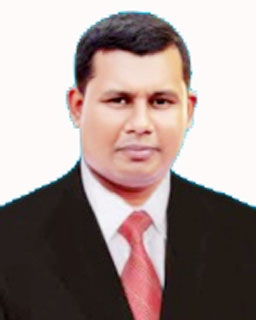
Badrul Huda Sohel :
Eid-ul-Fitr, one of the two most important religious festivals of the Muslim community, plays a significant role in maintaining harmony with other communities also. After a long month of fasting, Eid comes to every house of the Muslim world with a message of joy and happiness. Sadly, due to the outbreak of Covid-19 pandemic in the last two years, almost every country in the world, including Bangladesh, has been deprived of the joy of Eid. As the Covid-19 situation is much more normal now, this year’s Eid, like before, seems to bring us more joy with great enthusiasm.
We, the Bengalis are naturally peace-loving. From the emergence of our independent Bangladesh till date, it can be seen that although this land is a blend of Hindus, Muslims, Buddhists and Christians, the people of this Janapad give utmost importance to communal harmony irrespective of race, religion, caste and color. Communal harmony does not mean concinnity, feeling or love between some people of a particular class or group; rather it refers to amicable relationship or bond of love between people of all communities or groups. Eid of the Muslim community is one such festival in our country which strengthens the base of communal harmony.
The joy of Eid is a feeling that purifies the soul by annihilating envy, hatred or egoism of our mind and it has a long effect on our family and social life. Eid transcends the boundaries of enmity and hostility, lessens gaps and builds smooth bridges of friendship. On the occasion of Eid, people of our society tend to remain in touch or make inquiries about their neighbors and share their joys and sorrows. That is why people of other religions and communities living around us get allied by love and honor and exchange Eid greetings with the people of Muslim community without any hesitation. Social relations and alliances then become the main spirits. Eid teaches ethereal harmony, solidarity and purity without considering classes of high and low.
Although Eid is for the people of all ages, it is a little more joyous and important for children and teenagers in our society. No one can be found during Eid morning in one’s life without holding father’s hand while going to the Eid ground. Sharing Eid greetings and joys after wearing new dresses is part of our culture. In our country, small fairs are still organised in the afternoon on the day of Eid in suburbs and villages and these fairs double the joy of Eid among the children and adolescents.
In the last two years, maintaining social distancing was one of the conditions for controlling coronavirus transmission, and this is the reason why Eid Jamaat was not held in the open space or in the big Eidgah Maidan. As the transmission is now, to a large extent, under control, this time the rich and the poor will perform prayers in the same row with double enthusiasm and religious fervor. Performing Eid prayers standing shoulder to shoulder in the same row gives rise to a different kind of amicable and fraternal spirit in the Muslim community.
Since Eid means joy, it is our social responsibility to ensure that the poor are not deprived of that very joy and exhilaration. The significance of Eid lies in the sacrifice of well-off community during Eid and standing by the side of the miserable people with love and cooperation. It is hoped that in this last moment of Ramadan, they will continue their contribution by distributing Eid essentials. The government is also expected to perpetuate allocating houses for the underprivileged people like this year in order to provide safe shelter to them.
While the holy month of Ramadan teaches us to eliminate the defilement of our souls through purification and restraint, Eid-ul-Fitr is the day for us to actualise the lesson. Regardless of the black and the white, the rich and the poor, the educated and the uneducated, the powerful and the powerless, the master and the slave, Eid-ul-Fitr conveys the message of emancipation and harmony to mould a strong sense of brotherhood around the globe.
(The writer is Assistant Professor and Chairman, Department of English, Ishakha International University).

